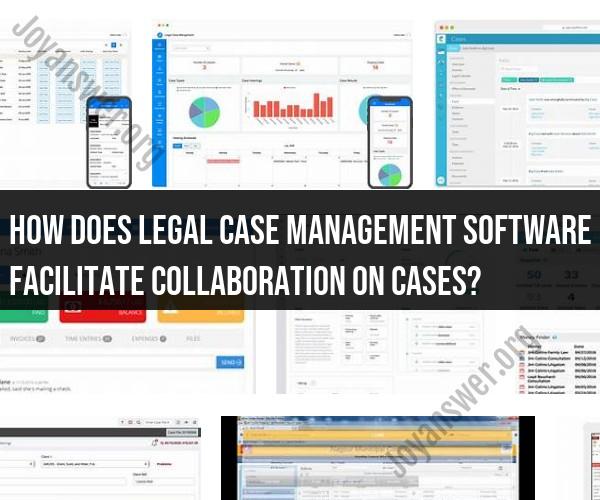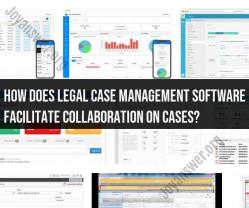How does legal case management software facilitate collaboration on cases?
Legal case management software plays a crucial role in streamlining collaboration among legal professionals, clients, and other stakeholders involved in a case. Here's how it facilitates collaboration:
Centralized Information: Legal case management software provides a centralized platform where all case-related information is stored. This includes documents, correspondence, notes, deadlines, and more. Having a single repository ensures that everyone involved in the case can access the most up-to-date information.
Document Management: These software solutions often come with document management features. They allow legal teams to upload, store, and organize case documents in a structured manner. Team members can collaborate on these documents, make edits, leave comments, and track versions, all within the software.
Task Assignment: Legal case management software allows for the assignment of tasks and responsibilities to specific team members. Lawyers, paralegals, and support staff can see their tasks, deadlines, and priorities, ensuring everyone is on the same page regarding their roles in the case.
Communication Tools: Many case management solutions include communication tools like email integration and messaging systems. This enables seamless communication between team members, clients, and even external parties like opposing counsel.
Calendar and Deadline Management: Legal professionals can set important deadlines and court dates within the software's calendar feature. This ensures that everyone is aware of upcoming events and can plan accordingly.
Client Portals: Some case management software offers client portal features, allowing clients to log in and access case information, documents, and updates. This improves transparency and keeps clients informed about the progress of their cases.
Automation and Workflow: Workflow automation features can streamline routine tasks and processes, reducing manual effort and the risk of errors. For example, the software can automatically generate standard legal documents or reminders for upcoming deadlines.
Access Control: Legal case management software often includes robust access control features. This ensures that sensitive or confidential information is only accessible to authorized personnel, helping maintain client confidentiality and data security.
Reporting and Analytics: These solutions often come with reporting and analytics tools. Users can generate reports on case progress, billing, and other key metrics, allowing for data-driven decisions and improved case management.
Mobile Accessibility: Many modern case management systems offer mobile apps or browser access, enabling legal professionals to collaborate on cases from anywhere, at any time.
Integration Capabilities: Legal case management software can often integrate with other tools commonly used in the legal profession, such as legal research databases, billing software, and e-discovery platforms. This ensures a seamless workflow and data exchange between different systems.
In essence, legal case management software enhances collaboration by providing a comprehensive platform that brings together all aspects of a case, from documents and deadlines to communication and task management. This not only improves efficiency but also enhances the quality of legal services provided to clients.












